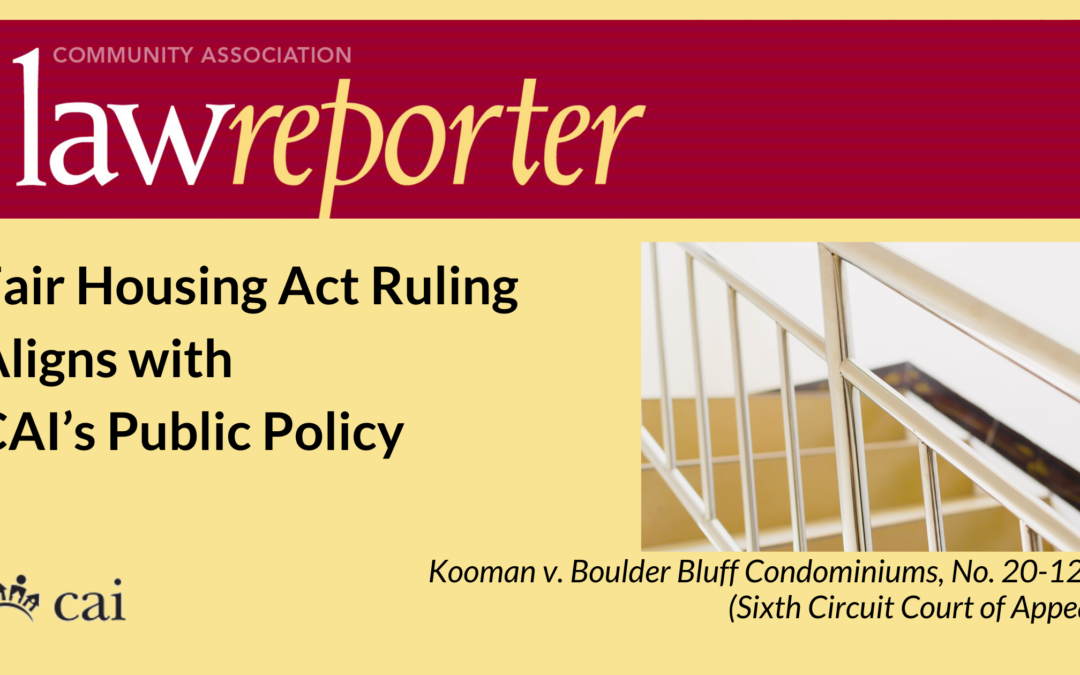On November 5, 2020, the Sixth Circuit Court of Appeals ruled that an association did not violate the federal Fair Housing Act (FHA) when it denied a resident’s request for a reasonable accommodation when the disability was not specified, and there was nothing in the request to indicate to the board that the accommodation was necessary.
The bylaws of a Michigan condominium association required approval from the association’s board of directors for any structural modifications to a unit. The bylaws prohibited the board from approving any structural modifications that would jeopardize or impair the condominium’s soundness, safety, or appearance.
A resident who had heart problems fell several times from the condominium unit’s front porch, and felt that a handrail was needed to help him move to and from it. The resident’s daughter made a request to the board asking that a handrail be installed on the porch step within the condominium property, without providing a reason for the request and not disclosing any information about the resident’s disability.
The association’s board denied the request because the proposed handrail would be a permanent change to the unit’s overall appearance and the installation would damage the concrete porch, violating the community’s bylaws without a reasonable purpose for the accommodation. The board also encouraged the resident to obtain a doctor’s note if the reason for the accommodation was a disability.
After the denial, the resident received a doctor’s note explaining the disability. Instead of providing this information to the board, the unit owner retained an attorney who contacted the board and demanded a reversal of their decision. The board approved the handrail once they received notice of the disability; however, the resident proceeded to sue the association, alleging that their handling of the request violated the FHA and several state laws.
Following a series of appeals, the Sixth Circuit Court ruled in the association’s favor. It determined that the association was not aware of the resident’s disability when the request was made, and there was no evidence the board acted out of discriminatory spirit, and therefore did not violate the FHA.
The facts in this case are a prime example of the importance of communication between board members and residents, especially when it comes to reasonable accommodation requests for a disability. In this case, had the resident or board established a dialogue, the initial—though proper— denial would not have happened.
CAI stresses the importance of creating and sustaining a sense of community among residents and association leaders and how crucial effective communication can be to create this sense of harmony. Please use CAI’s Rights and Responsibilities for Better Communities when faced with this type of challenge in your association.
This ruling directly aligns with CAI’s public policy on fair housing, which supports the right of community associations to enforce their covenants, bylaws, and rules, provided they do not illegally discriminate against any protected class. CAI supports the right of all individuals to be free from discrimination on the basis of race, color, religion, sex, familial status, national origin, or disability and encourages fair and reasonable interpretations and administration of, or changes to, fair housing acts and related legislation and regulations.
This Sixth Circuit Court’s fair housing ruling was highlighted in the December 2020 issue of CAI’s Community Association Law Reporter, a monthly, members-only newsletter that provides a brief review of important court decisions impacting community associations throughout the U.S. Cases deal with developer liability, powers of the association, use restrictions, covenant enforcement, assessment collections, and much more.
In addition, CAI’s College of Community Association Lawyers prepares a yearly case law update. The database includes summaries of these cases, along with their references, case numbers, dates, and other data.



